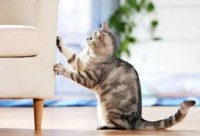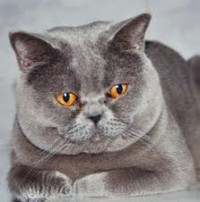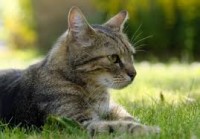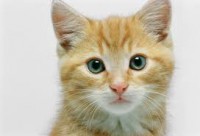Feline Cystitis or FLUTD
As we approach the shortest day of the year Downunder, I am reminded to elaborate on a common problem that recurs in susceptible cats at this time of the year, cystitis or feline lower urinary tract disease (FLUTD).
The majority of cystitis in cats is a behavioural disease that is triggered by the stress of increasing and decreasing daylight and the effect this has on the feline brain.
It is actually a disease that almost certainly would not occur in these cats if they were intact and sexually active since the problem is displaced or suppressed mating behaviour.
With no reproductive outlet for behaviour these cats manifest physical disease in the urinary tract secondarily to stimulus to the pineal gland in the cat’s brain. As the pineal registers and responds to changes in daylight hours, the mating reflex is triggered, irrespective of the absence of gonads. The brain is the largest sex organ in mammals and it causes many diseases by mixed messages and faulty feedback to other organs.
Feline lower urinary tract disease (FLUTD) has been around for as long as I have been practicing veterinary medicine and there are other causes for this ubiquitous disease including such things as urinary tract infections, crystals in the urine and other behavioural stresses like moving the litter box or the presence of a new cat in the house or yard. It has been managed by numerous interventions that go in and out of fashion over many years and range from cage rest, severe dietary restrictions or medications up to the more drastic ‘sex change’ operation we used to perform in male cats to prevent blockage by inflammatory debris or crystals. Understanding that the majority of these cases are now termed idiopathic, meaning that there is no identifiable or proven causation, most of them are cured by adjusting behavioural stressors and giving them raw meaty bones to chew to reduce stress and strengthen their vitality. Cooked grain based commercial diets potentiate inflammation even though one of the only proven treatments for FLUTD in recent times has been shown to be a prescription commercial diet.
I used to wonder why many cats consistently re-presented with this disease midsummer and midwinter until I discovered the link to breeding season through my studies in homeopathy. Whilst blood in the urine and crystals are present in a number of cases these are generally secondary findings in a cat that has been behaving strangely and urinating inappropriately from stress. It has been shown that women who insist on visiting the toilet to empty their bladders before every concert, play or theatre performance whether they need to go or not, are more prone to behaviourally induced cystitis for the same reason. The inflammation (cystitis) is secondarily induced by the behaviour and is not the cause or primary factor in disease or discomfort.
Cats, being creatures of ritual and routine, will not tolerate having their toilet habits disrupted by interlopers visiting their territory during ‘crazy season’ or any other time for that matter. The short and long day effect however will bring even the most placid and easy- going cat into a risk zone for these obsessive behaviours that predispose to urinary bladder inflammation. There are very few people who do not panic when they see their cats passing drops of blood and straining to urinate. If the cat is a male cat there is sometimes cause for concern as we must determine if the bladder is full or empty. A blocked urethra in a cat is potentially life threatening.
There is still controversy over the effect of prepubertal desexing, especially castration, as a predisposing factor to urethral blockage in male cats. I have come to the conclusion after many years observation that it is an advantage to grow cats to full maturity before desexing them and there is evidence emerging now to support this practice even though it is not always practical to keep animals intact past puberty. Immature animals and those desexed early will have infantile genitalia resulting in smaller diameter urethra and a theoretically higher predisposition to blockage should inflammation occur in these individuals. This has not yet been proven with studies but other disadvantages have been recently demonstrated including poorer endocrine functioning in animals desexed at an early age.
From a therapeutic basis, there are many first aid homeopathic medicines that can instantly relieve the distress most FLUTD cats exhibit. By far the most important treatment is to limit the cats’ range of territory for a day or two by restricting access to the whole house or yard. This is best termed ‘cage rest’ and if you have a crate or similar enclosure large enough for a litter tray, a bed and a food and water bowl they will be well served. Blocking off a portion of a small room and enforcing compulsory rest by restricting usual daily activity achieves the same result. This gives the cat a space to de-stress and contrary to expectation, is very well tolerated and welcomed by all afflicted individuals. The most effective homeopathic medicines to have on hand include cantharis, apis, arnica and rescue remedy or emergency essence. These can be administered directly to the mouth or put in the drinking water if they are alcohol spray based preparations. In chronic, refractory or advanced cases a constitutional approach is also beneficial and will require a consultation with a veterinary naturopath or homeopath.
Any cat that is male must be properly examined to determine that the urinary bladder is emptying adequately and any cat that is unresponsive to the basis first aid described will need veterinary attention as soon as possible and further investigation.
It is reassuring to have some understanding of these problems so that we can continue to help domesticus Felis catus remain fearless and domesticated.
Cat, my cat,
You cry for constant affection.
I have affection plus compassion.
Therefore
Stop crying,
Start smiling.
I tell you a supreme secret:
“I treasure your dependence.”
“If you have even a cat or a dog or anything that is innocent and younger than you in spirit, in soul, then naturally it is your duty to help it, guide it, mould it.”
Sri Chinmoy





May 10th, 2025 at 10:31 am
Hello! I’ve recently discovered your site, I love it and you have made me laugh out loud, thank you, as I’m in troubled times! I was looking up Lachesis yesterday and you conviction that cats are snakes with fur made me nearly cry with laughter. At the moment, one of my cats indeed feels like that cat. And I really don’t like snakes. I’d just finished a zoom catch up call with a homeopathic vet. We are in London (UK) – he’s not. So only been Zoom. For both cats. I have a standard local vet too (not doing homeopathic or herbal). The female snake cat is 15 (long haired tortoiseshell moggy). My boy is nearly 14. Short haired. Both neutered. I stupidly gave in to pressure to have teeth out (lesions) and clean in Jan/Feb. What a mistake! Not infected. I was managing it. Then our world turned upside down. Our female had a mini stroke. Her behaviour changed totally – or rather, her always slightly bonkers behaviour became that but on steroids! She turned on my boy cat and terrorised him, stalked him. I’ve managed to get a long way with stroke symptoms. Turns out I did ok. But something is still wrong. I’ve managed to ween her off Gabapentin as she was utterly spaced and it wasn’t good re recovery. Same with boy. Just a tiny bit for him now (they both have osteoarthritis). Since all this, he now has stage 1/2 kidney disease (he was fine before op). Yesterday the zoom vet witnessed her go for me, as my hubby brought her to the screen whilst very cross. I thought he was giving her to me. Anyway, once again I was lacerated and ended up with blood on my nose. Etc. He has changed remedy to Lachesis. 6c. Am waiting for that. Meanwhile, in desperation, dissolved a pillule 30c in water, put on food. Sadly, not seeing difference yet. Tried yesterday and this morning. Maybe the 6c will be more profound. But…aggression starts soon after eating. It can come and go or take all day. I defo feel bowels/urine are slow. But also thought reflux/indigestion? She let me massage her tummy Thurs eve and did not lash out. I cuddled her just now and all was calm. Until I popped her down on sofa – and she lashed out at me. Attention? A variety for remedies have worked at calming and helping over the last 3 months. They include chamomilla, belladonna, apis, Gelsemium (hom vet recommendation). I’ve always found carbo veg good over the years, when she’s been “bunged up” seemingly. I have indeed tried cantharis too. Just trying to cover symptoms I’ve seen.
I’m still giving her Ruta and Rhus tox to help her old achey bones.
It’s distressing. But must be horrid for her. She was never viscous. And it’s not helping sooth things with both cat. They were defo never best buddies (we got him after we tragically lost our first young boy to the road). She wasn’t best pleased. But they’ve always jogged along fine, with the odd spat.
I will continue to use your site, for your interpretations as I really enjoy them. It’s such a lovely approach. I didn’t suppose you can help us in our search for some harmony but I’m putting it out there, just in case.
They have indeed been best buddies and joy during some difficult years in amongst it, so I just want to try and do the best. It’s been a shock.
Very best wishes, Ros